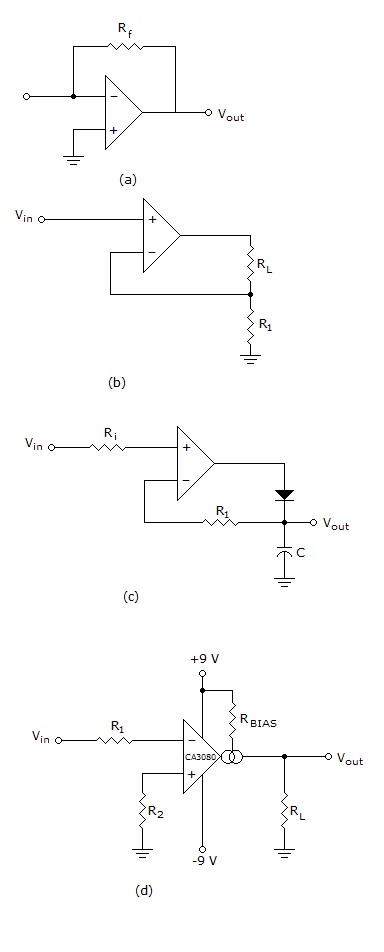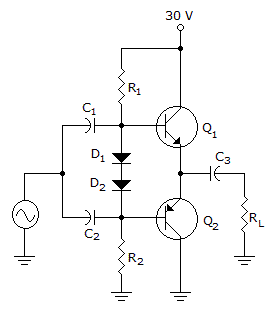Discussion
Home ‣ Electronics ‣ Special-Purpose Op-Amp Circuits See What Others Are Saying!
- Question

Refer the given circuits. Which circuit is known as an OTA?
Options- A. a
- B. b
- C. c
- D. d
- Correct Answer
- d
- 1.

The maximum peak-to-peak output voltage in the given circuit is 15 V.
Options- A. True
- B. False Discuss
- 2. In a parallel resistive circuit:
Options- A. there is more than one current path between two points
- B. the voltage applied divides between the branches
- C. the total branch power exceeds the source power
- D. the total circuit conductance is less than the smallest branch conductance Discuss
- 3. What is the range between f1 and f2 of an RLC circuit that resonates at 150 kHz and has a Q of 30?
Options- A. 100.0 kHz to 155.0 kHz
- B. 147.5 kHz to 152.5 kHz
- C. 4500 kHz to 295.5 kHz
- D. 149,970 Hz to 150,030 Hz Discuss
- 4. After a voltage has been applied to an inductor, the current will be ___ of its full value after 2 time constants.
Options- A. 63%
- B. 86%
- C. 95%
- D. 98% Discuss
- 5. 4 amperes will flow through a 10 Ω resistor if 20 volts are placed across the resistor.
Options- A. True
- B. False Discuss
- 6. Dark current is a small reverse current that flows in a photodiode that is receiving no light.
Options- A. True
- B. False Discuss
- 7.

The voltage dropped across the resistor in the circuit in the given circuit is approximately equal to ___.
Options- A. 5 V
- B. 10 V
- C. 7.98 V
- D. 6.02 V Discuss
- 8. What are the basic building blocks that all matter is composed of?
Options- A. electrons, neutrons, and protons
- B. two protons for each neutron
- C. two protons for each electron
- D. electrons, neutrons, and charged ions Discuss
- 9. Electrical equipment is protected against excessive current by a(n):
Options- A. fusible wire link
- B. insulated glass container
- C. metal ended coil
- D. circuit opener Discuss
- 10. If voltage across a resistance doubles
Options- A. the current is halved
- B. the resistance doubles
- C. the current is unchanged
- D. none of the above Discuss
More questions
Correct Answer: False
Correct Answer: there is more than one current path between two points
Correct Answer: 147.5 kHz to 152.5 kHz
Correct Answer: 86%
Correct Answer: False
Correct Answer: True
Correct Answer: 7.98 V
Correct Answer: electrons, neutrons, and protons
Correct Answer: fusible wire link
Correct Answer: none of the above
Comments
There are no comments.More in Electronics:
Alternating Current and VoltageAlternating Current vs Direct CurrentAnalog and Digital ConvertersAnalog to DigitalArithmetic Operations and CircuitsBasic Op-Amp CircuitsBipolar Junction Transistors (BJT)CapacitorsCombinational Logic CircuitsComputer Hardware and SoftwareDiodes and ApplicationsField Effect Transistors (FET)Flip-Flops and TimersInductorsLogic Circuit SimplificationLogic GatesMagnetism and ElectromagnetismMeasurement, Conversion and ControlNumber Systems and CodesOhm's LawOperational AmplifiersParallel CircuitsProgrammable Logic Devices (PLD)Quantities and UnitsRC CircuitsResistance and PowerRL CircuitsRLC Circuits and ResonanceSemiconductor MemorySemiconductor PrinciplesSequential Logic CircuitsSeries-Parallel CircuitsSeries CircuitsSpecial-Purpose Op-Amp CircuitsStandard Logic Devices (SLD)Testing and TroubleshootingThyristors and TranducersTime Response of Reactive CircuitsTransformersTransistors and ApplicationsVoltage and CurrentProgramming
Copyright ©CuriousTab. All rights reserved.
